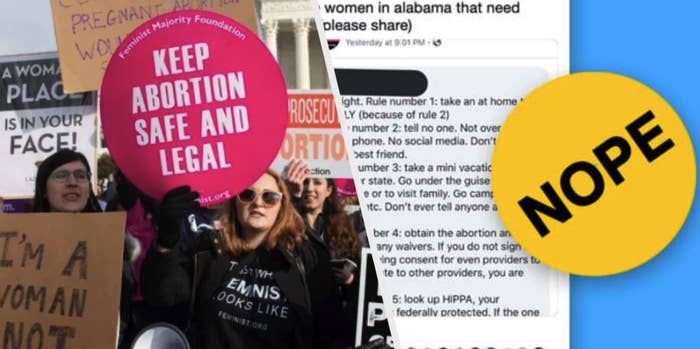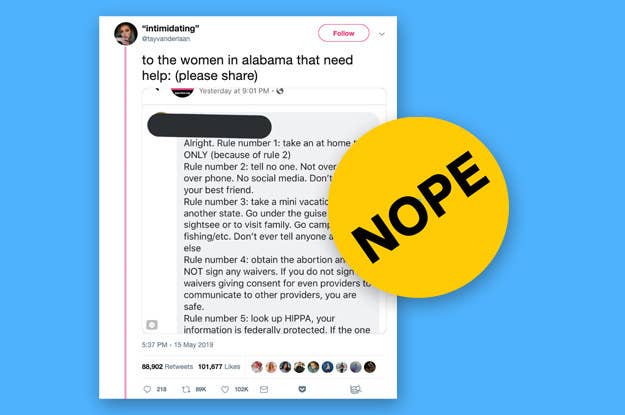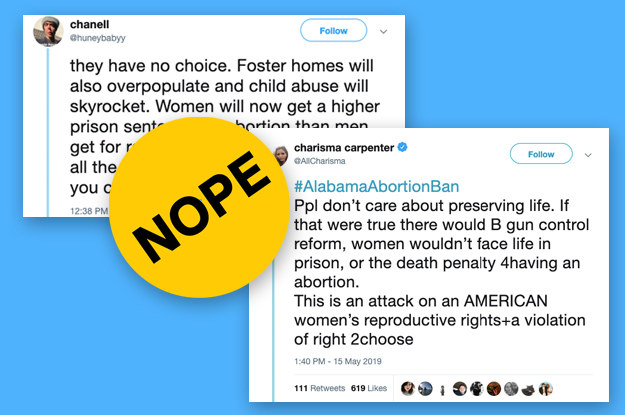
On Tuesday, Alabama passed the strictest abortion law in the United States, banning all abortions except in cases where the mother’s health is at “serious” risk. Georgia, Ohio, and Missouri have also passed restrictive laws on abortion. However, none of these laws are in effect yet.
False and misleading information about abortion access began circulating immediately, some of it caused by a misinterpretation of the bill. Other false claims are similar to what researchers have documented in the past, according to Brandie Nonnecke, the director of the CITRIS Policy Lab at the University of California, Berkeley.
Nonnecke recently published research on computational propaganda and reproductive rights, which found old debunked stories entering online conversations and automated harassment from bot accounts. Nonnecke said those accounts are now targeting women who are sharing their stories online in light of the Alabama ban, using derogatory words like “slut” or “whore,” which further stigmatizes abortion.
“I looked at some of the bot accounts that we’ve confirmed before,” she said. “They’re still active and are even sending the exact same tweets.”
The intention of the disinformation, according to Nonnecke, is often to increase division about an already politically charged issue.
“I think it’s doing exactly what it’s trying to do,” Nonnecke said, “and really broadening the chasm of either side of debates.”
BuzzFeed News is tracking viral claims and falsehoods in an ongoing list.
1. No, abortion does not become illegal as soon as the bill is signed into law.

One viral message purporting to give women instructions on how to get an out-of-state abortion implies that the ban is already in effect. However, abortions have not yet been banned in Alabama.
Abortion rights groups are also planning to sue states with abortion bans, which will likely be blocked in court, as they have been when similar bills were approved in the past. They will not go into effect unless they reach the Supreme Court and, as a result, Roe v. Wade is overturned — a process that will likely take at least a year.
The instructions, which discourage women from telling anyone and even from using the phone, are not the right course of action, according to Planned Parenthood.
“I would definitely discourage people from further isolating themselves, and encourage people to do just the opposite,” said Barbara Ann Luttrell, a spokesperson for Planned Parenthood in Alabama, Georgia, and Mississippi.
By telling women to keep quiet, the instructions also imply that women could be prosecuted or that the state could go after them for seeking or getting an abortion. That’s not true. The Alabama law would jail doctors for providing abortions, not women.
The best advice for women seeking an abortion or even more information about the procedure is to call a legitimate clinic and get information directly from health care providers, according to Dr. Atsuko Koyama, an abortion provider in Georgia and a fellow with Physicians for Reproductive Health.
“The most important thing for patients to know is that they should feel comfortable calling clinics in their own state and out of state,” Koyama said. In her experience, clinics are very aware of the legal situation in their respective states and can help guide patients to the care they need.
Women in affected states need to know that, as of now, nothing has changed for their appointments, Luttrell said.
“Abortion is still safe, legal, and available,” she said.
Rather than isolating themselves, Luttrell encourages women who are willing to share their stories.
2. Yes, women can still get abortions and those who have appointments can still go forward with the procedure.
These bans aren't in effect — yet. You can still make an appointment at your local health center, and get care. We will fight to ensure that patients — and everyone in this country — can still access health care, no matter what. #ALpolitics
Because none of the laws recently passed across the US have gone into effect, both Luttrell and Koyama said women can continue with existing appointments and make new ones.
“First and foremost — clinics are still open,” Koyama said.
Planned Parenthood said women have been phoning its clinics to ask whether new laws in Alabama, Georgia, Ohio, and Missouri now mean appointments for abortions in those states are canceled. They are not.
“These bans aren't in effect — yet. You can still make an appointment at your local health center, and get care,” the official Planned Parenthood account tweeted after the Alabama bill was signed.
However, patients should be aware of anti-abortion centers posing as abortion clinics targeting women who are looking for abortions. Koyama said the best way to find a provider is to go through organizations like Planned Parenthood or the National Abortion Federation, which has a list of clinics in the US and abroad. Another way to differentiate a real clinic from an anti-abortion one is to ask logistical questions.
“If a woman is seeking abortion services, what’s most important is to find out about gestational periods, insurance coverage, and asking logistical questions,” Koyama said.
3. No, women in Alabama will not go to prison if they get an abortion.

People online are speculating that women will go to prison if they get an abortion. That’s false. The Alabama law specifies that women who receive an abortion will not be held liable for it.
"This bill would provide that a woman who receives an abortion will not be held criminally culpable or civilly liable for receiving the abortion," the legislation states.
4. Yes, doctors in Alabama could be imprisoned for performing an abortion after the law goes into effect.
So if I perform an abortion for a woman who was raped in Alabama, I would go to jail for many more years than the rapist himself? Cool, cool, cool, makes sense, not insane at all
Although women would not be held liable for getting an abortion, doctors will be held criminally responsible for performing one.
“The bill criminalizes doctors. It doesn’t target women,” Luttrell said.
According to the bill, doctors could be charged with a class A felony, which carries a punishment of between 10 and 99 years in prison, for performing an abortion. Attempting to carry out an abortion would face a class B felony.
5. No, the bill does not explicitly criminalize miscarriages.
So let's recap: → sex ed is discouraged → birth control is impossible to access → abortion and miscarriage are considered felonies → felons can't vote
Luttrell of Planned Parenthood said that criminalizing miscarriages is not the explicit purpose of the bill. She stresses that the law is still not in effect, and because it is being challenged in court, it may never be. If it does, it’s difficult to know how the issue of miscarriages would be interpreted by judges.
“We can’t really begin to hypothesize about what could happen,” she said. “That’s not the intended consequences of the bill.”
Luttrell also stressed that because the law is not yet active, women should feel safe going to their doctor or the hospital if they feel like something isn’t right.
6. Yes, Plan B is still available.
People of Alabama: Plan-B is available over the counter and has a shelf-life of four years.
Plan B is emergency contraception, not an abortion pill. But Koyama said having it for yourself, your friends, or your family is a good idea. Plan B does not need to be kept in the fridge, and each box should have an expiration date on it.
Koyama also noted that another form of emergency contraception could be getting a copper IUD, which will also help protect patients from unwanted pregnancies.
